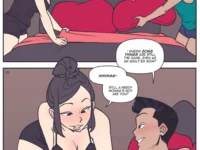Riba bl comic







Riba BL manga info and recommendations. …
“Seme,” “uke,” and “riba” are terms referring to a character’s role in a male/male sexual relationship mostly used in the Boys’ Love (BL) genre community. “Seme” refers to the character who is the more dominant half and usually takes the lead in the relationship. In contrast, “uke” refers to the character who is less dominant or follows the lead in the relationship. You can roughly say that it’s the equivalent of top and bottom as sexual positions in English. “Riba,” on the other hand, describes a relationship in which the characters’ roles are not strictly unchanged, and they can switch roles between seme and uke. It also indicates a character who can switch and do both seme and uke roles.
Compared to seme and uke, riba is a more recent concept. While the BL manga industry has a lot more works portraying reversible relationships recently, it is more commonly found in the doujinshi (self-published works) community. A lot of people are very strict about their taste and preference, and for some, finding riba in the works they’re reading is a huge turn-off. This is the reason doujinshi works that portray a riba relationship usually come with warnings.
This varied usage preference similarly happens to English-speaking fan communities as well, though notably, people seem to be more inclined in using seme and uke when talking about original BL manga instead of transformative works. The not-strictly defined and switchable riba relationship appears to be less of an issue within the English-speaking fandom compared to the Japanese one. If you want to know more about this, do take your time to check out the result of futekiya’s survey on the usage of seme and uke in English-speaking BL fans community here!
Presumably, this difference in aesthetics happens because the comics are artists drawing actual men, while
Boys Love as a term then comes about in the 90’s when there became a bigger space in professional publishing for Otoko Doushi content. Its kinda made a thing by a animanga news magazine and a new magazine that marked itself as “Boy’s love comics”. June also goes on a publishing hiatus around the time and while they’re gone commercial BL at large blossoms, and notably there’s a decrease in the tragic tropes present in a lot of June stories and more happy endings. Another thing to note is that as BL carves a bigger space in publishing we see these stories completely disappear from shoujo manga which is a trend has only reversed in the recent decade.
Other successful series in GloBL include web comics
“Seme,” “uke,” and “riba” are terms used in the Boys’ Love (BL) genre community to describe a character’s function in a male/male sexual relationship. “Seme” refers to the character who is the more dominant part of the relationship and usually takes the lead. In contrast, “uke” refers to the character in the relationship who is less powerful or who follows the lead. In English, it’s essentially equivalent to the top and bottom sexual positions. “Riba,” on the other hand, refers to a relationship in which the characters’ roles do not remain strictly unchanged and they can rotate between seme and uke. It also denotes a figure who can move between seme and uke roles.
“Riba”()is written in katakana as a shorthand for “reversible” (), indicating that the couple’s sexual duties are not firmly defined. Interestingly, unlike “seme” and “uke,” “riba” is highly popular among Japan’s LGBT community. Also, you must try to play this
Riba is a newer idea than seme and uke. While the BL manga business has recently seen an increase in the number of works depicting reversible relationships, it is more typically found in the doujinshi (self-published works) community. Many people are highly particular about their tastes and preferences, and finding riba in the works they’re reading is a tremendous turn-off for some. This is why doujinshi works depicting a riba relationship are frequently accompanied by a disclaimer.
This varying use preference also exists in English-speaking fan circles, albeit people appear to be more prone to use seme and uke when discussing original BL comics rather than transformative works. The non-strictly defined and switchable riba relationship appears to be less of an issue in the English-speaking fanbase than it is in the Japanese fandom. If you’d like to learn more about this, have a look at the results of futekiya’s poll on the use of seme and uke in the English-speaking BL fan community here!





























